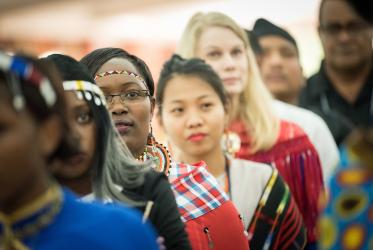The climate emergency and its devastating impact on food and water, sustenance and survival was at the center of their discussions, which will be translated into concrete actions they will take back to their home communities.
Hosted in partnership with the Pacific Conference of Churches, the fourth edition of the WCC Eco School equipped participants with the tools to become eco-advocates for an earth in peril.
Rev. James Bhagwan, general secretary of the Pacific Conference of Churches, described ecological challenges as “real-life challenges” in the “liquid continent of the Pacific region” and for our entire planet.
“As people of the land and the sea we are mindful of the exploitation of creation and recognise the deep spiritual connection we have with creation,” he said.
In her opening address, Prof. Dr Isabel Apawo Phiri, WCC deputy general secretary, emphasized that youth are not the leaders of tomorrow, but rather the leaders of the world today. “The world is in peril if we disregard youth leadership and empowerment," she said.
“The youth hold the rest of the world accountable for a sustainable future,” added Phiri.
Due to the COVID-19 pandemic, this year the Eco School was held in a hybrid format with both online and onsite training, bringing together 50 young people from five countries simultaneously (Fiji, Tonga, Vanuatu, Tuvalu and Solomon Islands).
The Pacific region has been demonstrably vulnerable to increased frequency of extreme weather events, massive storms, and sea level rise that has submerged islands and coastal villages. Forest fires and water scarcity are also clear impacts of climate change.
While the region is coping with these challenges, the Eco School highlighted the importance of building resiliency of the communities by including and empowering all people.
Within a few weeks, Eco School participants will be creating action plans to implement in their communities.
Several “eco ambassadors” (alumni of previous Eco Schools) were able to join the sessions and give their testimonies of how the Eco School has transformed their lives.
Read the addresses by WCC deputy general secretary Prof. Dr Isabel Apawo Phiri to the Eco School:
Opening ceremony
Closing ceremony










